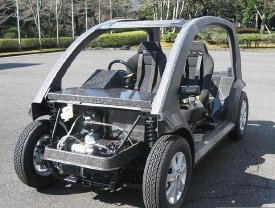Teijin Limited announced today that it has established the world's first mass production technologies for carbon fiber reinforced plastic (CFRP), achieving a significant reduction of the cycle time required for molding automobile cabin frame to less than one minute. The breakthrough overcomes one of the biggest challenges in the industry and represents a long stride toward the use of carbon fiber for the mass production of automobiles and other products.
Teijin's new technologies include intermediate materials made of thermoplastic resin instead of conventional thermosetting resin for molding-use CFRP. Teijin also developed technologies for welding thermoplastic CFRP parts together and for bonding CFRP with materials such as steel, both of which will help to reduce the use of metal in manufacturing processes.

Going forward, Teijin intends to develop mass production applications for CFRP in automobiles and many other items that require certain levels of structural strength, such as machine tools and industrial robots.
New Intermediate Materials
By impregnating carbon fiber with thermoplastic resin, Teijin developed three intermediate materials for the production of CFRP suited for use in mass-production vehicles. The materials can be used selectively depending on the required strength and cost of the part, and they can be made with various thermoplastic resins, including polypropylene and polyamide. The new intermediate materials are as follows:
- Unidirectional intermediate: ultrahigh strength in a certain direction.
- Isotropic intermediate: optimum balance of shape flexibility and multidirectional strength.
- Long-fiber thermoplastic pellet: high-strength pellet made from carbon fiber, suited for injection molding of complex parts.
New Technologies
Using these new intermediate materials, Teijin developed its unprecedented new technologies for the press molding of CFRP within just one minute's time. The technology also is simpler than conventional methods. In addition, Teijin developed technologies for welding thermoplastic CFRP parts together, and also for bonding CFRP with materials such as steel.
Electric-Vehicle Concept Car
To demonstrate its new cutting-edge technologies, Teijin has developed an electric-vehicle (EV) concept car that features a cabin frame made entirely from thermoplastic CFRP and weighing only 47 kilograms, or roughly one fifth the weight of a conventional automobile's cabin frame. The four-seat EV, which is capable of speeds up to 60 km/hour and has a cruising range of 100 km, embodies Teijin's vision of super-lightweight EVs made with CFRP.
Teijin will use the concept car to introduce its technologies to automakers and parts suppliers, and also to promote joint initiatives to develop lighter automobiles. Teijin also aims to establish new midstream and downstream business models for its carbon-fiber composites business by supplying CFRP parts to the market.